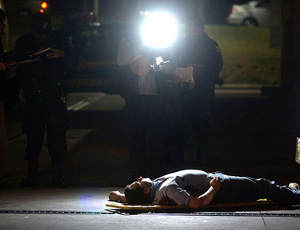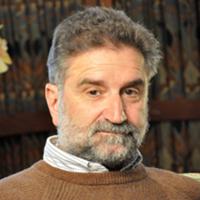
[Editor's note: By arrangement with New America Media, veteran international correspondent Frank Viviano will contribute regularly to The Tyee. He is based in Barga, Italy.]
"Nothing focuses the mind like a hanging," the saying goes. In my case, focus came with the sharp edge of a machete held to my throat and a pistol aimed at my head.
Early this spring, the van I was traveling in while on assignment in Guatemala was forced into the jungle by four hooded men. My fellow passengers and I, all foreigners, were relieved of everything we carried -- money, credit cards, cameras, passports, driver's licenses, cellphones. Each of us in turn was shoved bodily into the vehicle's aisle, the machete hovering just under our chins and a battery of handguns and rifles trained on us.
We remained calm and cooperative and no one was hurt, in large part because we assumed that serious violence was unlikely. We were nearly dead wrong about that. When I returned to Guatemala City by bus, after walking out of the jungle, I learned that one American had been shot during a hold-up the day before, and another the day after.
Two days later, 19 Guatemalans were beheaded on a ranch 20 miles away from the site of our abduction and robbery.
This is Guatemala -- and much of Central America -- today: a grim tapestry of crime and mayhem, with the annual passage of $40 billion worth of cocaine as its backdrop.
The probability of a violent death in Guatemala in 2010 was seven times greater than in Iraq, and more than 10 times greater than in the gun-crazy United States. In neighboring Honduras and El Salvador, statistically the two most violent nations on Earth, it was even higher.
Guatemala and El Salvador experienced ghastly civil wars between 1960 and 1995, with an estimated 250,000 deaths. The murder rate in both countries now exceeds the levels of the war years.
Behind this homicidal nightmare lies a 3,000-mile chain of narcotic supply and demand, anchored by Colombian and Mexican drug cartels on one hand, and U.S. consumers on the other. Together, they have devastated some of the poorest nations on the planet, recruited their jobless young people as hired gunmen, and bankrupted the few legitimate industries that might have seeded genuine economic development.
An honest, focused assessment of the crisis leads to a single conclusion: the only way to end the cocaine criminal nightmare is to decriminalize cocaine. "The global war on drugs has failed, with devastating consequences for individuals and societies around the world," a high-level commission reported this month.
El Peten and the mara
El Peten, the northern province of Guatemala where my mind was so sharply focused by the edge of a machete, is ground zero in the Central American nightmare.
The tale of its descent into the abyss begins in Washington DC a decade ago, with a dramatic reinforcement of Coast Guard patrols and other activities aimed at interdicting cocaine shipments from South America via the Caribbean.
The cartels soon found it necessary to abandon the Caribbean routes. But in remarkably short order, they managed to shift much of their transport operations to land. In effect, the new strategy led to the wholesale takeover of Honduras, El Salvador and Guatemala by organized crime.
One of the major unintended consequences of the U.S. drug enforcement approach, the international study notes, has been the emergence of a "huge criminal black market, financed by the risk-escalated profits of supplying international demand for illicit drugs." The study was carried out by the Global Commission on Drug Policy, a bi-partisan international body chaired by former U.S. Secretary of State George P. Shultz that includes five former presidents or prime ministers.
Small planes and boats now ferry cocaine to isolated coves on the Pacific Coast and remote Central American air strips, across waters where U.S. interdiction efforts are very difficult, if not impossible. From there, the drugs are carried over mule tracks to El Peten, where they are refined in hidden labs and consolidated for onward shipment. Their guards are provided by Guatemala's fast-growing network of "mara," the regional slang term for criminal gangs.
Before the unwitting collaboration of Washington policymakers and Latin American drug cartels turned Guatemala into a narcotic highway, its annual homicide rate was 26 killings per 100,000 people. It is now approaching 60. The corresponding figure for Iraq at the height of its bloodletting in 2004 was 7.3.
Cocaine smuggling leaves a trail of illicit cash everywhere it thrives. It corrupts the law enforcement agencies meant to combat it. (At the police station where I filed a useless deposition, I was told that "no crime had been committed in the area in more than three years.") It corrupts trucking and car-rental firms that double as freight carriers for 350 tons of narcotics passing through El Peten each year.
Most insidiously, it corrupts the region's young, mostly indigenous Native Americans who are the footsoldiers of the mara and have no other employment prospects. They quickly grow dependent on cocaine cash and often use the drug themselves. The mara are encouraged to rob and kill in their spare time, augmenting their income and discouraging outsiders from traveling through the trafficking corridors.
The ruins of Tikal, the greatest city in the ancient Mayan empire, are 10 miles north of the site where I was mugged. In the three hours I waited for police on the highway that serves it, exactly two cars passed. Tikal, a potential tourism gold mine, is as empty as it was after Mayan civilization collapsed a millennium ago.
According to the World Bank, Guatemala in 2011 is the third hungriest nation on the planet, with more than 50 percent of its children suffering from chronic malnutrition. The average citizen has just four years of schooling. Over half the population of 14 million lives on less than two dollars per day, and more than a quarter of them on less than one dollar.
Imagine the impact of $40 billion worth of cocaine in that landscape, and you begin to acquire focus.
The case for decriminalization
For more than a generation, the United States has met the influx of South American drugs with astronomically expensive, militarized security programs -- wall-building and armed patrols along the Mexican border, high-tech surveillance and warship deployment on the Caribbean, helicopter assaults on coca plantations in Peru and Bolivia. At home, it has spent billions more in an orgy of criminal prosecutions and prison-building.
The results include a vast proliferation of organized crime clans abroad, especially in Mexico, that are even more brutal than their predecessors, and a staggeringly overcrowded domestic prison system that serves as a de facto graduate school in the narcotics trade.
"About three-quarters of new admissions to state prisons are for nonviolent crimes," former U.S. president Jimmy Carter noted in a June 16 New York Times op-ed article. "And the single greatest cause of prison population growth has been the war on drugs, with the number of people incarcerated for nonviolent drug offenses increasing more than twelvefold since 1980."
The policy has also wrought unprecedented levels of death and devastation in three of our hemisphere's least-developed and most powerless nations.
What it hasn't done is reduce the ability of drug suppliers to move their products north, or the willingness of affluent North Americans and Europeans to pay huge sums of money for cocaine. The Global Commission points out that cocaine worldwide cocaine use has risen by 27 per cent in the past decade.
It pains me that it took a machete at my throat before I recognized the self-defeating purposelessness of U.S. enforcement policies. Before I faced the hard truth that decriminalization is the only answer -- and the harder truth that no politician or bureaucrat in Washington is likely to address the crisis honestly.
Decriminalization, supporters of the military war on drugs say, would only concede victory to the cartels.
Yet decriminalization is surely the turn of events that traffickers most fear. It would reduce cocaine to the same status as tobacco, alcohol and many prescription drugs, substances that are perilous to those who abuse them but can be taxed and controlled. Deaths due to overdoses of prescription drugs have risen by 400 per cent since 2000 in the United States. No one argues that they should be made illegal.
I have no sympathy for the well-heeled consumers who account for 80 per cent of cocaine consumption in the United States, much less the murderous cartels that supply them. But sympathy isn't the point. Decriminalization, put simply, would drive the cartels out of business.
It would end the devastation that makes normal life a distant and ever-receding fantasy for the people of Central America.
Handled intelligently, it might even produce a much-needed tax windfall from $40 billion worth of annual self-indulgence. ![]()
Read more: Rights + Justice















Tyee Commenting Guidelines
Comments that violate guidelines risk being deleted, and violations may result in a temporary or permanent user ban. Maintain the spirit of good conversation to stay in the discussion.
*Please note The Tyee is not a forum for spreading misinformation about COVID-19, denying its existence or minimizing its risk to public health.
Do:
Do not: